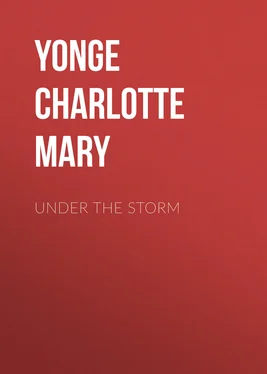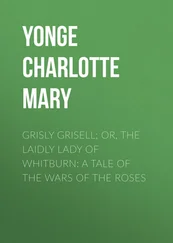Charlotte Yonge - Under the Storm
Здесь есть возможность читать онлайн «Charlotte Yonge - Under the Storm» — ознакомительный отрывок электронной книги совершенно бесплатно, а после прочтения отрывка купить полную версию. В некоторых случаях можно слушать аудио, скачать через торрент в формате fb2 и присутствует краткое содержание. Жанр: Альтернативная история, literature_19, foreign_antique, foreign_prose, Исторические приключения, на английском языке. Описание произведения, (предисловие) а так же отзывы посетителей доступны на портале библиотеки ЛибКат.
- Название:Under the Storm
- Автор:
- Жанр:
- Год:неизвестен
- ISBN:нет данных
- Рейтинг книги:4 / 5. Голосов: 1
-
Избранное:Добавить в избранное
- Отзывы:
-
Ваша оценка:
- 80
- 1
- 2
- 3
- 4
- 5
Under the Storm: краткое содержание, описание и аннотация
Предлагаем к чтению аннотацию, описание, краткое содержание или предисловие (зависит от того, что написал сам автор книги «Under the Storm»). Если вы не нашли необходимую информацию о книге — напишите в комментариях, мы постараемся отыскать её.
Under the Storm — читать онлайн ознакомительный отрывок
Ниже представлен текст книги, разбитый по страницам. Система сохранения места последней прочитанной страницы, позволяет с удобством читать онлайн бесплатно книгу «Under the Storm», без необходимости каждый раз заново искать на чём Вы остановились. Поставьте закладку, и сможете в любой момент перейти на страницу, на которой закончили чтение.
Интервал:
Закладка:
"We must use it up," said Patience, "for we have got no churn."
"And we could not get into the town to sell the butter if we had," returned her brother. "We had better take it up to some one in the village who might give us something for it, bread or cheese maybe."
"I would like to make my own butter," sighed Patience, whose mother's cleanly habits had made her famous for it.
"So you shall some day, Patty," said her brother, "but there's no getting into Bristol to buy one or to sell butter now. Hark! they are beginning again," as the growl of a heavy piece of cannon shook the ground.
"I wonder where our Jeph is," said the little girl sadly. "How could he like to go among all those cruel fighting men? You won't go, Stead?"
"No, indeed, I have got something else to do."
The children were hard at work all the time. They cleared out the inside of their hovel, which had a floor of what was called lime ash, trodden hard, and not much cracked. Probably other hermits in earlier times had made the place habitable before the expelled monk whom the Kentons' great-grandfather recollected; for the cell, though rude, was wonderfully strong, and the stone walls were very stout and thick, after the fashion of the middle ages. There was a large flat stone to serve as a hearth, and an opening at the top for smoke with a couple of big slaty stones bent towards one another over it as a break to the force of the rain. The children might have been worse off though there was no window, and no door to close the opening. That mattered the less in the summer weather, and before winter came, Stead thought he could close it with a mat made of the bulrushes that stood up in the brook, lifting their tall, black heads.
Straw must serve for their beds till they could get some sacking to stuff it into, and as some of the sheep would have to be killed and salted for the winter, the skins would serve for warmth. Patience arranged the bundles of straw with a neat bit of plaiting round them, at one corner of the room for herself and Rusha, at the opposite one for Stead. For the present they must sleep in their clothes.
Life was always so rough, and, to present notions, comfortless, that all this was not nearly so terrible to the farmer's daughter of two centuries ago as it would be to a girl of the present day. Indeed, save for the grief for the good father, the sense of which now and then rushed on them like a horrible, too true dream, Steadfast and Patience would almost have enjoyed the setting up for themselves and all their contrivances. Some losses, however, besides that of the churn were very great in their eyes. Patience's spinning wheel especially, and the tools, scythe, hook, and spade, all of which had been so much damaged, that Smith Blane had shaken his head over them as past mending.
Perhaps, however, Stead might borrow and get these made for him. As to the wheel, that must, like the churn, wait till the siege was over.
"But will not those dreadful men burn the town down and not leave one stone on another, if Jeph and the rest of them don't keep them out?" asked Patience.
"No," said Stead. "That is not the way in these days—at least not always. So poor father said last time we went into Bristol, when he had been talking to the butter-merchant's man. He said the townsfolk would know the reason why, if the soldiers were for holding out long enough to get them into trouble."
"Then perhaps there will not be much fighting and they will not hurt Jeph," said Patience, to whom Jeph was the whole war.
"There's no firing to-day. Maybe they are making it up," said Steadfast.
"I never heeded," said Patience, "we have been so busy! But Stead, how shall we get the things? We have no money. Shall we sell a sheep or a pig?"
Stead looked very knowing, and she exclaimed "Have you any, Stead? I thought Jeph took it all away."
Then Stead told her how his father had entrusted him with the bulk of the savings, in case of need, and had made it over to the use of the younger ones.
"It was well you did not know, Patty," he added. "You told no lie, and Jeph might have taken it all."
"O! he would not have been so cruel," cried Patience. "He would not want Rusha and Ben to have nothing."
Stead did not feel sure, and when Patience asked him where the hoard was, he shook his head, looked wise, and would not tell her. And then he warned her, with all his might and main against giving a hint to anyone that they had any such fund in reserve. She was a little vexed and hurt at first, but presently she promised.
"Indeed Stead, I won't say one word about it, and you don't think I would ever touch it without telling you."
"No, Patty, you wouldn't, but don't you see, if you know nothing, you can't tell if people ask you."
In truth, Stead was less anxious about the money than about the other treasure, and when presently Patience proposed that the cave where they used to play should serve for the poultry, so as to save them from the foxes and polecats, he looked very grave and said "No, no, Patty, don't you ever tell anyone of that hole, nor let Rusha see it."
"Oh! I know then!" cried Patience, with a little laugh, "I know what's there then."
"There's more than that, sister," and therewith Stead told in her ear of the precious deposit.
She looked very grave, and said "Why then it is just like church! O no, Stead, I'll never tell till good Mr. Holworth comes back. Could not we say our prayers there on Sundays?"
Stead liked the thought but shook his head.
"We must not wear a path up to the place," he said, "nor show the little ones the way."
"I shall say mine as near as I can," said Patience. "And I shall ask God to help us keep it safe."
Then the children became absorbed in seeking for a place where their fowls could find safe shelter from the enemies that lurked in the wood, and ended by an attempt of Stead's to put up some perches across the beam above the cow-shed.
Things were forward enough for Rusha and Ben to be fetched down to their new home that night; when Patience went to fetch them, she heard that the cessation of firing had really been because the troops within the town were going to surrender to the King's soldiers outside.
"Then there will be no more fighting," she anxiously asked of Master Blane.
"No man can tell," he answered.
"And will Jeph come back?"
But that he could tell as little, and indeed someone else spoke to him, and he paid the child no more attention.
Rusha had had a merry day among the children of her own age in the village; she fretted at coming away, and was frightened at turning into so lonely a path through the hazel stems, trotting after Patience because she was afraid to turn back alone, but making a low, peevish moan all the time.
Patience hoped she would be comforted when they came out on their little glade, and she saw Stead stirring the milk porridge over the fire he had lighted by the house. For he had found the flint and steel belonging to the matchlock of his father's old gun, and there was plenty of dry leaves and half-burnt wood to serve as tinder. The fire for cooking would be outside, whenever warmth and weather served, to prevent indoor smoke. And to Patience's eyes it really looked pleasant and comfortable, with Toby sitting wisely by his young master's side, and the cat comfortably perched at the door, and Whitefoot tied to a tree, and the cows in their new abode. But Jerusha was tired and cross, she said it was an ugly place, and she was afraid of the foxes and the polecats, she wanted to go home, she wanted to go back to Goody Grace.
Stead grew angry, and threatened that she should have no supper, and that made her cry the louder, and shake her frock at him; but Patience, who knew better how to deal with her, let her finish her cry, and come creeping back, promising to be good, and glad to eat the supper, which was wholesome enough, though very smoky: however, the children were used to smoke, and did not mind it.
Читать дальшеИнтервал:
Закладка:
Похожие книги на «Under the Storm»
Представляем Вашему вниманию похожие книги на «Under the Storm» списком для выбора. Мы отобрали схожую по названию и смыслу литературу в надежде предоставить читателям больше вариантов отыскать новые, интересные, ещё непрочитанные произведения.
Обсуждение, отзывы о книге «Under the Storm» и просто собственные мнения читателей. Оставьте ваши комментарии, напишите, что Вы думаете о произведении, его смысле или главных героях. Укажите что конкретно понравилось, а что нет, и почему Вы так считаете.












